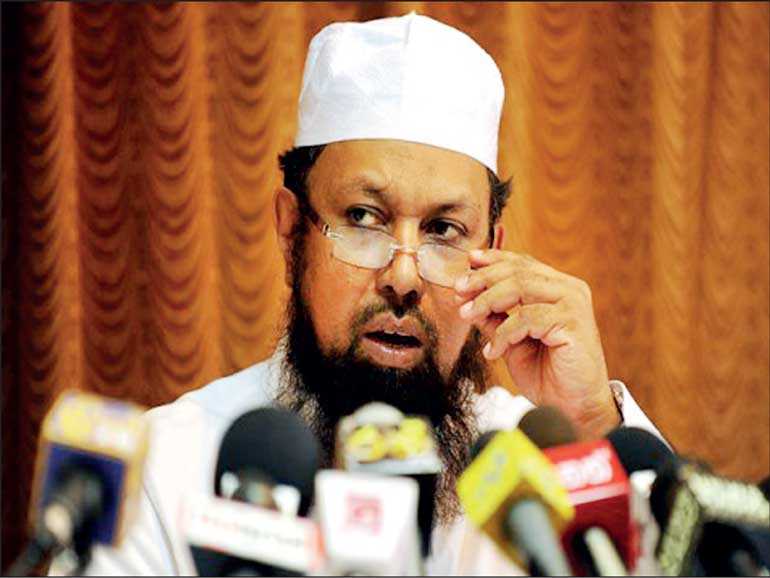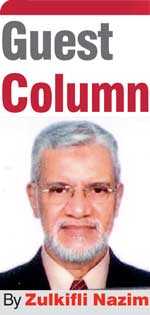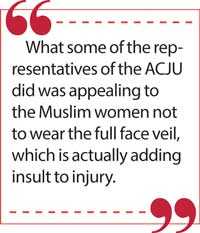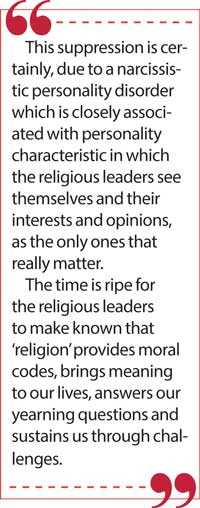Monday Feb 16, 2026
Monday Feb 16, 2026
Wednesday, 22 May 2019 00:00 - - {{hitsCtrl.values.hits}}

“And say: Truth has now arrived, and Falsehood has perished: for Falsehood by its very own nature is bound to perish.” Holy Quran: Chapter 17 Verse 81.
Every discussion, debate and discourse that we see and hear over the audio – visual and print media, members of the priesthood of various religions and the educated and knowledgeable layman belonging to various communities including the Muslim community, were pointing their fingers at the All-Ceylon Jamiathul ‘Ulama (ACJU) as to why they have not come out as a body, to proclaim and declare that the Niqab/Burqah, must be banned by law – why are they silent on this issue, after all this Niqab and Burqah does not constitute part of the religion of Islam.
What some of the representatives of the ACJU did was appealing to the Muslim women not to wear the full face veil, which is actually adding insult to injury. That observation is indeed commendable and praiseworthy.
The truth
The Prophet of Islam conveyed to his followers: “When your women folk go out of their homes, make certain that the public recognise them as to whose wife she is, whose mother she is, whose daughter she is and whose sister she is; in order that they may not be molested or harmed.” What unparalleled guidance!
This is in addition to the Quranic injunction that they can expose “what must ordinarily appear thereof”.
A popular interpretation by esteemed and reputed exegetes of this phraseology is, that women are permitted to expose body parts that are necessary for day-to-day tasks. This is usually taken to be the face and the hands. Intelligent, rational and coherent interpretation, which is totally in line with the Quran and the Tradition of the Prophet of Islam.
Why was this truth suppressed by this institution – Jamiathul ‘Ulama?
This suppression is certainly, due to a narcissistic personality disorder which is closely associated with personality characteristic in which the religious leaders see themselves and their interests and opinions, as the only ones that really matter. It is indeed a matter of pride for them.
And this trait and mental attitude is imbibed and assimilated in the majority of those who call themselves “‘Ulama”, copiously and profusely. The age-old English adage ‘Pride comes before a fall’ is absolutely true and indisputable, in this current scenario.
We think it is time that the majority of those religious leaders – the ‘Ulama – get off their high horse and be realistic and know that Islam is a progressive religion. Islam is not something to be stuck with some ancient barbaric tribal practices, which has nothing to do with us.
It is clearly understandable why very few Muslims follow these tasteless and garish practices. Most of their mosques and preachers are funded by the radical Saudi regime, and it would be difficult for the common moderate Muslim or even some of the ‘Ulama to raise their voices against them.
The religious leaders must know for a fact that recognising unity in diversity in today’s world is inevitable, irrespective of race, religion, caste or creed.
These religious leaders have a major part to play – the ‘Ulama must take upon themselves to stamp out extremism and willingly leave their own comfort zone and be genuinely comfortable with people from diverse backgrounds. To do just that, their duty is to ingrain and instil in individuals to creatively respond to life’s challenges while leading lives of gratitude and acceptance. 
They, the ‘Ulama, should do this through actively reorienting their minds as well as the mindset of their followers from selfish pursuits that generate suffering in ourselves and others, to more wholesome actions of giving, discipline, patience, generating vital energy, contemplation and ultimately the pursuit of wisdom.
Religion should heal our collective and individual wounds by binding us and others. When we fail to be tolerant of others, we fail absolutely.
The time is ripe for the religious leaders to make known that ‘religion’ provides moral codes, brings meaning to our lives, answers our yearning questions and sustains us through challenges.
The world’s great faiths – those ligatures to the Divine, speak to the collective good of society. They offer us a code of conduct and moral compass for living, help us exult in profound human love, and strengthen us against hatred, hostility, aggressiveness, enmity and profound human loss.
It will be pertinent for me to quote at this juncture – Brian E. Melendez, American Indian spirituality scholar. He said that: “The role of religion in larger society should be, that if you set up a church, mosque, synagogue, sweat lodge, etc. then you shall be responsible for the upkeep of the surrounding community in which you occupy – better yet, be responsible and accountable for a community outside of your particular agency, social circles, economic periphery, and belief system.”
Therefore it becomes a moral obligation on the religious leaders to emphasise that the role of religion should be to establish unity and concord among the people and religion should not be the cause of dissension and strife; but assist in the development and welfare of the country, assist in the tranquillity of the people and bring about the much-needed peace for all.
To achieve the unity and harmony that the world so desperately needs, religion should have us love each other – expressed in not just in words but in deeds, be the means for engendering and influencing fellowship and light up the world with happiness with obedience to the laws of the country where we have been granted sanctuary.
Lastly a quote from Professor Mark W. Muesse of Rhodes College: “It is important to accept the fact that Confucius, Lord Buddha, Jesus, and Muhammad were teaching different visions of the ultimate reality leading to different ways of being genuinely human. All four sages indicate that satisfaction or happiness lies at the end of the path for those who practice the way of the noble life. Yet they are equally clear in telling us the noble life is no easy path. Today, we are more likely to be taught to pursue excellence. Nobility involves excelling, but it also involves discerning which pursuits are worth the effort.”
(The writer counts over 50 years in the insurance industry and is an Associate of the Chartered Insurance Institute (London) and also holds the title of Chartered Insurance Practitioner; as well as an Associate of the Insurance Institute of India. He can be reached via email at [email protected].)